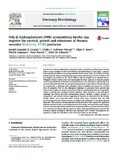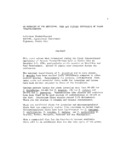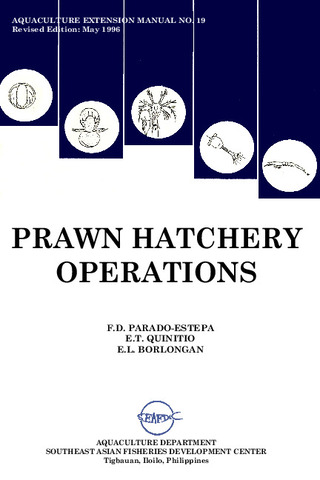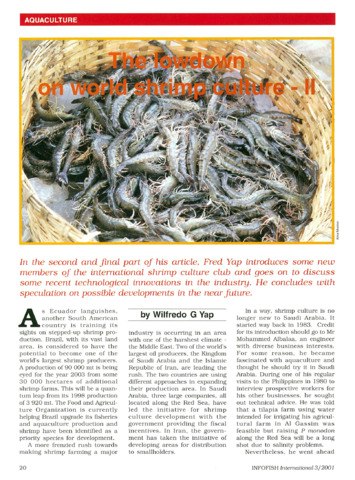Poly-β-hydroxybutyrate (PHB) accumulating Bacillus spp. improve the survival, growth and robustness of Penaeus monodon (Fabricius, 1798) postlarvae
- Global styles
- MLA
- Vancouver
- Elsevier - Harvard
- APA
- Help

View/
Date
2014Author
Page views
2,279AGROVOC keyword
Taxonomic term
Metadata
Show full item record
Share
Abstract
Low larval survival resulting from suboptimal culture conditions and luminous vibriosis poses a major problem for the larviculture of penaeid shrimp. In this study, a poly-β-hydroxybutyrate (PHB) accumulating mixed bacterial culture (mBC; 48.5% PHB on cell dry weight) and two PHB accumulating bacterial isolates, Bacillus sp. JL47 (54.7% PHB on cell dry weight) and Bacillus sp. JL1 (45.5% PHB on cell dry weight), were obtained from a Philippine shrimp culture pond and investigated for their capacity to improve growth, survival and robustness of Penaeus monodon postlarvae (PL). Shrimp PL1 and shrimp PL30 were provided with the PHB containing bacterial cultures in the feed for 30 days followed by, respectively, a challenge with pathogenic Vibrio campbellii and exposure to a lethal dose of ammonia. Prior to the pathogenic challenge or ammonia stress, growth and survival were higher for shrimp receiving the PHB accumulating bacteria as compared to shrimp receiving diets without bacterial additions. After exposure to the pathogenic challenge the shrimp fed PHB accumulating bacteria showed a higher survival as compared to non-treated shrimp, suggesting an increase in robustness for the shrimp. Similar effects were observed when shrimp PL30 were provided with the PHB accumulating bacterial cultures during a challenge with pathogenic V. campbellii through the water. The survival of shrimp exposed to lethal ammonia stress showed no significant difference between PHB accumulating bacteria-fed shrimp and non-PHB treated shrimp. The data illustrate that bacilli capable of accumulating PHB can provide beneficial effects to P. monodon post-larvae during culture in terms of growth performance, survival and resistance against pathogenic infection and ammonia stress. Further investigations are required to verify the PHB effect of the bacterial cultures on the shrimp.
Suggested Citation
Laranja, J. L., Ludevese-Pascual, G., Amar, E. C., Sorgeloos, P., Bossier, P., & De Schryver, P. (2014). Poly-β-hydroxybutyrate (PHB) accumulating Bacillus spp. improve the survival, growth and robustness of Penaeus monodon (Fabricius, 1798) postlarvae. Veterinary Microbiology , 173(3-4), 310-317. https://doi.org/10.1016/j.vetmic.2014.08.011
Type
ArticleISSN
0378-1135Collections
- Journal Articles [1262]
Related items
Showing items related by title, author, creator and subject.
-
An overview of the nutrition, feed and feeding techniques of prawn penaeid/shrimps
Piedad-Pascual, Felicitas (Philippine Council for Aquatic and Marine Research and Development, 1989)This paper echoes what transpired during the first International Conference of Penaeid Prawns/Shrimps held in Iloilo City in December 4-7, 1984, particularly on the Nutrition nd Feed Development. Around 25 papers were ... -
Series: Aquaculture extension manual; No. 19
Prawn hatchery operations
Parado-Estepa, Fe D.; Quinitio, Emilia T. ; Borlongan, Emeterio L. (Aquaculture Department, Southeast Asian Fisheries Development Center, 1996-05)
The manual, an updated version of the 1984 SEAFDEC/AQD manual, presents the underlying principles and step-by-step instructions of prawn larval and post-larval rearing. The techniques described are not only applicable to ...
; Borlongan, Emeterio L. (Aquaculture Department, Southeast Asian Fisheries Development Center, 1996-05)
The manual, an updated version of the 1984 SEAFDEC/AQD manual, presents the underlying principles and step-by-step instructions of prawn larval and post-larval rearing. The techniques described are not only applicable to ... -
The lowdown on world shrimp culture - II
Yap, Wilfredo G. (INFOFISH, 2001)This paper introduces some new members of the international shrimp culture club and goes on to discuss some recent technological innovations in the industry, particularly the polyculture of tilapia (mainly Oreochromis ...





